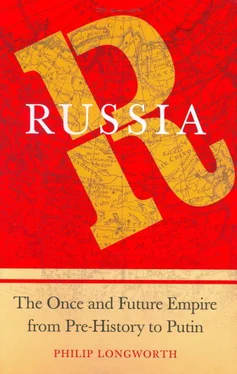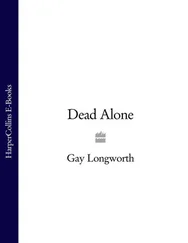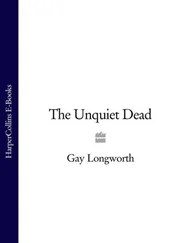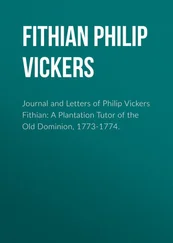Among the victims of Ivan’s executioners was his personal physician and astrologer the Cambridge-educated Dr Elisei Bomel. The learned Bomel may have borne some responsibility for the increasingly uncontrollable fits of rage that Ivan suffered from in later life. An autopsy on Ivan’s remains has revealed that he suffered from the acutely painful condition known as ankylosing spondylitis — that is, his spine was locked in a stooping position. Inhalation of mercury vapour was evidently prescribed to excess in order to help him with the pain, and scholars have recently suggested that, over the years, this medication resulted in neurological damage which produced insomnia and contributed to his rage attacks. 33It was in one of these bouts in 1581 that he unintentionally killed his son Ivan, who was being groomed to succeed him. But for that, the succession crisis, and the political desta-bilization, which followed Ivan’s death on 18 March 1584 might well have been avoided.
Meanwhile, the strains and costs of Ivan’s wars of imperial expansion and the internal upheaval he created in his attempts to pay for his campaigns contributed to an economic crisis which struck Russia in the latter part of the sixteenth century. As a result, many urban settlements were abandoned by their inhabitants, who fled to the countryside, and there was a large-scale movement of population from central and north-western Russia to the south and south-east. 34The effect was not only to diminish tax revenues but also to pauperize many servicemen who depended on their peasants for their income. The government tried to combat this trend by restricting the right of peasants to move except during a brief period after the autumn harvest, and by allowing their lords to pursue and reclaim those who flitted. This was the beginning of the oppressive system known as serfdom.
At the root of the problem was the fact that the Russian state could not accumulate sufficient specie to issue good coin in sufficient quantity to pay its servicemen in cash. It therefore had to supply them with land in lieu. But the land was useless without labour, and small landlords, such as the holders of service estates, were not able to attract labour in competition with the great landowners, who could afford to offer peasants better terms of tenure. So the state had to intervene to save the servitors from their predicament at the expense of the peasants’ freedom. Serfdom did not yet exist formally as an institution, but from Ivan’s reign it became progressively inevitable.
In the long term, the oppressive effects of serfdom were to aid Russian expansion by encouraging a steady flow of people ready to pioneer newly discovered or recently secured territories at the periphery of the state. However, by the 1580s Ivan’s main expansionist thrusts had all been halted. Poland and Sweden had blocked Russia’s roads westward and to the Baltic; the Turks blocked the advance to the south. And Ivan himself seemed a broken man. He had finally conceded failure in the war for Livonia; he had brought ruin to much of his realm, and destroyed many of its best human assets. Compared with such costs, his achievements seemed slight indeed. In his last testament, redolent with quotations from the Bible, he gave vent to despair and self-pity: ‘My spirit is afflicted, my spiritual and bodily wounds have increased, and there is no physician to heal me… I have found no comforters, they have repaid me with evil for my kindness and hatred for my love.’ 35
Resentful and full of foreboding, one imagines, both for his empire and for the state of his soul, Ivan confronted death. He died in 1584, and Russia did indeed fall into ruin. Before long, the pretensions to imperial status were to seem almost risible.
HISTORIANS OFTEN ATTRIBUTE Russia’s descent into anarchy in the early 1600s to Ivan’s misrule, yet the tyrant’s death did not mark the onset of what Russians call ‘the era of confusion’ and we in the West know as the ‘Time of Troubles’. Indeed, there was something of a recovery However disappointing the terms that ended the Livonian war may have been politically, the conclusion of hostilities the year before Ivan’s death eased the economic pressure on the country Recognition that the terror of Ivan’s oprichnina had gone for good gave hope to many; there was a breathing space, a chance to stabilize the country after the disruptions of the oprichnina — and the new tsar’s government seized the opportunity.
Economic activity revived; the outward migration of population from the Moscow region ceased. Abandoned villages were gradually resettled. Service gentry, in despair at losing their peasant tenants, who had been leaving for the freedom of the frontier areas or for large estates which offered them terms that mere gentry could not afford, were mollified by new laws. These banned the departure of peasant tenants before St George’s Day (the end of the autumn harvest), and authorized their recovery by force for a period thereafter. At the same time, the weight of government demands on the peasantry was lightened.
The new domestic policy sought to establish internal calm after all the recent storms. It was paralleled by a foreign policy which guarded Russia’s essential interests without requiring any massive mobilization of resources. Dangerous ambition was abandoned, and feelers were put out to countries far and near offering co-operation for mutual benefit. The defences of the southern frontier were shored up; a twelve-year peace was concluded with Poland-Lithuania in 1591; diplomatic relations were established with the Ottoman Empire, and commercial relations with Holland and France. Only the confrontation with Sweden continued — but it was to result in the recovery of central Karelia and territories on the Gulf of Finland and Lake Ladoga which had been lost in the Livonian War. Another triumph, achieved by peaceful means, was the raising of the metropolitan see of Moscow, hitherto subject to the Patriarch of Constantinople, to the status of an independent patriarchate in 1591. This made the Russian Church effectively a national church, increasing both its authority and that of its partner, the state. 1
If Ivan’s misrule had made a collapse inevitable, the measures taken under his successor kept disaster at bay, and when the reckoning eventually came it was to be precipitated and deepened by factors independent of Ivan’s actions — by ‘acts of God’ that were quite unforeseeable.
The new tsar, Fedor, was the elder of Ivan’s two surviving sons. The younger, Dmitrii, was to die an accidental death in 1591. Years afterwards this event was to precipitate a crisis, but not at the time. True, Tsar Fedor was rumoured to be of limited ability — he was probably mentally retarded — but he served well enough as a figurehead, and he soon gained a reputation for piety, a critical indicator of legitimacy in that age and therefore a real political asset. Besides, it transpired that he was capable of siring an heir. His policies, however, are associated with those who managed affairs for him — the regents, his ministers.
These included the brothers Shchelkalov — Andrei, who had headed the Foreign Office (Posolskii prikaz) from 1570 to 1594, and Vasilii, who as head of both the Musketeer Office (Streletskii prikaz) and the Felony Department (Razboinii prikaz) was effectively in charge of state security. 2Two other leading lights were Dmitrii Godunov, a former oprichnik, and his brother Boris, who made a reputation as a financial manager. The Godunovs hailed from Kostroma on the Volga, where they were generous benefactors of the riverside Trinity Monastery. Both had been members of Ivan’s council of ministers; both were shrewd politically, and when Boris persuaded the Tsar to marry his sister his prospects were much enhanced.
Читать дальше





![Stephan Orth - Behind Putin's Curtain - Friendships and Misadventures Inside Russia [aka Couchsurfing in Russia]](/books/415210/stephan-orth-behind-putin-s-curtain-friendships-a-thumb.webp)





